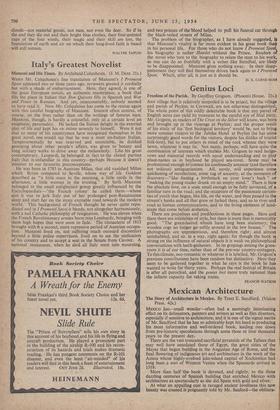Italy's Greatest Novelist
Manzoni and His Times. By Archibald Colquhoun. (J. M. Dent. 21s.) WHEN Mr. Colquhoun's fine translation of Manzoni's I Promessi Sposi appeared two or three years ago, reviewers greeted it cordially but with a shade of embarrassment. Here, they agreed, is one of the great European novels, an authentic masterpiece, a book that fills the place in Italian that Don Quixote fills in Spanish and War and Peace in Russian. And yet, unaccountably, nobody seemed to have read it. Now Mr. Colquhoun has come to the rescue again with this careful biography of Manzoni. Interest often centres, of course, on the lives rather than on the writings of famous men. Manzoni, though, is hardly a colourful, only at a certain level an enigmatic, personality. He lacked the Italian delight in the external play of life and kept his vie intim severely to himself. Were it not that so many of his countrymen have recognised themselves in his great novel, one would say that he was a most un-Italian Italian. Temperamentally he was reserved and unsociable, he disliked gossiping about other people's affairs, was given to botany and long solitary walks to drive away the melancholy. Like his great contemporary, Leopardi, he belonged in fact to the closed puritan Italy that is unfamiliar in this country—perhaps because it doesn't minister to our favourite preconceptions.
He was born in 1785 in Austrian Milan, that old vanished Milan which Byron compared to Seville, whose way of life Goldoni described as "a little mass in the morning, a little cards in the afternoon, a little woman in the evening." By birth Manzoni belonged to the small enlightened group greatly influenced by the Encyclopaedists —` the French colony' he called them—whose aim it was to jerk Italy out of her prolonged post-Renaissance sleep and start her on the stony excitable road towards the modern world. This background of French thought he never quite repu- diated and in I Promessi Sposi it blends, not altogether harmoniously, with a sad Catholic philosophy of resignation. He was eleven when the French Revolutionary armies burst into Lombardy, bringing with them high hopes that were soon to fade. The climacteric of 1815 brought with it a second,' more repressive period of Austrian occupa- tion. Manzoni lived on, not suffering much outward discomfort beyond a little police supervision, lived on to see the unification of his country and to accept a seat in the Senate from Cavour. A national monument, when he died all Italy went intb mourning, and two princes of the blood helped to pull his funeral car through the black-veiled streets of Milan.
The problem of the biographer, as I have already suggested, that Manzoni's vitality is far more evident in his great book t in his personal life. For those who do not know I Promessi Sph2, his biography is rather Hamlet without the Prince. Readers of the novel who turn to the biography to relate the man to his work, as one can do so fruitfully with a writer like Stendhal, are likely to be disappointed. Manzoni gives nothing away. In their disap- pointment they will find themselves driven back again to I Promessi Sposi. Which, after all, is just as it should be.
D. S. CARNE-ROSS


































 Previous page
Previous page